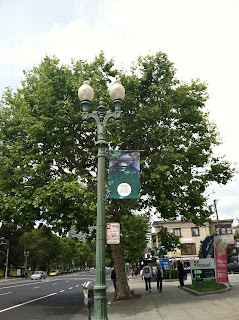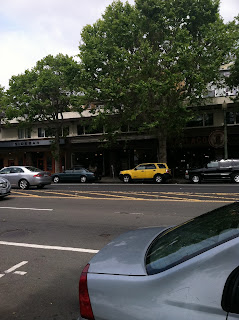A title wave of change is coming to downtown Oakland. When Manny and I moved to Oakland 14 years ago, downtown Oakland (and the area of downtown now called Uptown) was littered with vacant storefronts. Friends and neighbors warned us to walk with caution in downtown because of street crime and even minor drug dealing.
Yet despite the noticeably high business vacancy rate and crime, Manny and I quickly discovered that downtown did have vibrant businesses and restaurants. During the 1970's and 1980's, Oakland began a steady economic decline. Yet, many businesses were able to stay open despite the economic downturn. Today, there are many mom-and-pop restaurants, delis, coffee shops, convenience stores, and specialty shops which cater to a racially mixed middle-class workforce employed by large governmental and private organizations such as the City of Oakland, Alameda County, the Superior Court, the Federal Court, University of California, California Department of Transportation, Clorox, the Marriott Hotel, Kaiser Permanente, and the Oakland Tribune. The mom-and-pop businesses in downtown are owned by African-Americans, Whites, and immigrants from Africa, the Middle East, China, Vietnam, and Korea (to name a few). (On a side note: over the last 10 years there has been an influx of pot clubs and artists who were originally attracted to the area because of its central location and relatively affordable rents.
However, now that the tech boom is moving across the bay from San Francisco, I fear that the small mom and pop businesses will be forced out of downtown Oakland. Once the tech industry is established it will push up rents and will bring a wealthier and predominately White workforce who in turn will demand higher-end restaurants and specialty shops.
I have personally witnessed this type of change when I worked on Market close to Fell Street (about 3 blocks from San Francisco City Hall). About 6 years ago, Market had a high business vacancy rate and street crime was more prevalent. However, there were many small mom-and-pop businesses that catered to employees from City Hall, the Superior Court, State Fund, and Bank of America. I remember the wonderful Filipino family who ran a cafe on the corner of Market and Fell where I would get my morning coffee; the kids would help with customers before their dad would walk them to school. Next door was a very popular sandwich shop owned by a transgender Chinese woman. Next to that shop was a long established bar that served long-time San Francisco residents (I think the average age of the patrons was 65 years). All this changed when the city began massive layoffs during the "Great Recession." The mayor decided to invite the tech industry to "revitalize" Market and make the area more inviting to developers and tourists. The mom-and-pop businesses I remember are all gone because they could not survive in the new climate. Many of there clients disappeared due to lay-offs. Twitter moved in and brought a wealthier workforce. Today, the block has a high-end restaurant, high-end candy shop, and a high-end cafe. My husband and I were told by one of the waiters at the restaurant that Twitter employees make up the majority of their customers during the weeknights. The only thing that continues to be the same on Market are the homeless that sleep and huddle in doorways of vacant store fronts.
To sum up my feelings about the future of downtown Oakland: I am worried that new prosperity in downtown Oakland will not be shared. The small mom-and-pop businesses who kept downtown alive during the lean years will be forced out of their centrally located shops. They will either need to find a new location or possibly go out of business. Below are photos I have taken showing that some of this is already beginning. My prediction is it will increase when tech companies move into the old Sears building in 2016.
%2Bon%2BBroadway%2Bin%2BOakland.JPG) |
| Recently closed Sears building to be remodeled for incoming tech businesses |
 |
| Three of the five businesses on this block have closed or will close. The only business on this block which is thriving is "Donut Savant" (high-end donuts for foodies) |
 |
| Vo's Restaurant and Bar owned by an Afro-Amerasian woman has recently closed. According to the sign a Cuban Tapas restaurant will open in its place. |
 |
| Small mom and pop businesses hire local artists to paint on store fronts in hopes of keeping taggers away |
%2Bin%2BOakland.JPG) |
| Cassidy in front of a long time vacant business on Broadway which has a sign that a new restaurant will be moving in. |
.JPG) |
| Cassidy in front of mural at 19th Street Bart Station. 19th Street Bart has recently remodeled in order to make it look more attractive to commuters. |






%2Bon%2BBroadway%2Bin%2BOakland.JPG)



%2Bin%2BOakland.JPG)
.JPG)
.JPG)


